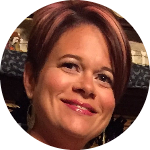Design Your Online Math Course with ALEKS® Based on the Quality in Online Learning Certification
We interviewed Dallas College Professor, Mary Merchant, about best practices for planning your course with ALEKS and your Quality in Online Learning Certification.

We interviewed Dallas College Professor, Mary Merchant, about best practices for planning your course with ALEKS and your Quality in Online Learning Certification.
How would you recommend a new faculty member get started?
"The first steps to teaching with ALEKS, online or face-to-face, are choosing the topics and deciding if a text will be linked. I find the best way to choose topics is to start with a test class where you select all course topics, then go through them and delete those you do not want. (This can be done in bulk, for example, if there is a topic you simply don't cover, you can delete all of those at once.) By doing this within ALEKS, you are not only able to see an example of each topic, but you are also getting used to working in Class Creation.
Once you have your topics, you need to decide how you want to set up the course. Are you dividing the topics into Weekly Objectives? Chapter-Based Objectives with due dates every two or three weeks? Are you going to use instructor-created homework in addition to the adaptive Objective work in ALEKS? Do you want to create your own Quizzes/Tests or use Scheduled Knowledge Checks? This is where your ALEKS Implementation Manager can be a great help - they can give you all sorts of examples of how others using ALEKS run their courses. The most important thing to remember is–Whatever it is you want to do with your class, ALEKS can help!
It's important to remember the adaptive capability of ALEKS is unparalleled, so you want to rely on that as much as possible. It's best to start by using as little instructor-created material as you can, then add it in for future semesters if you feel things are missing. ALEKS on its own is quite powerful. Trusting ALEKS is the best way to create a solid course that encourages students to work in their path and doesn't confuse them with a myriad of different assignment types and due dates."
What are some of the standards you need to keep in mind?
"When teaching online with ALEKS, it’s important to remember that while you can store documents, such as Syllabi, within ALEKS, it is probably a better practice to store them in your LMS that way your Syllabus, Course Outline, access to resources such as technical help and tutoring, are all easy to find.
Also, if ALEKS is not the sole place where students earn their grade (perhaps they work in the LMS as well), it is important to make it clear to students how their ALEKS Gradebook fits with whatever else they might be doing and make them aware of their current grade often."
What specific ALEKS tools would you recommend using?
“My number one is Scheduled Knowledge Checks. These are so much more meaningful than a traditional "Test" because they go through the entirety of the course. Maybe the student is behind in an Objective and hasn't covered Topics A yet, but entered the course with mastery of Topics B. They would earn a decent score based on the percentage of the course they have shown mastery of, even if they weren't at all familiar with the most current material. I believe this keeps students from giving up when they are behind because every grade isn't a bad one.”
What advice would you give an instructor who is just starting out with ALEKS?
“Whatever it is you want to do in your course, ALEKS can help you do it, and the more you let ALEKS take the wheel (use more adaptive and less instructor-created), the more you will learn about it. It's perfectly fine to have some homework or quizzes or tests created by the instructor, but it's imperative to realize how much effort ALEKS requires of the students. When I first heard about ALEKS, I thought it sounded too easy. Just go in and work problems, getting a certain number, right? Piece of cake. Then I worked as a student and saw first-hand what it required. Just working in the Pie alone is more robust and demanding than you would think. Instructors should take that into consideration before adding in homework, quizzes, and tests. I recommend taking the minimalist approach at first, do as little of that as you feel comfortable, then add later if you feel it is necessary."


